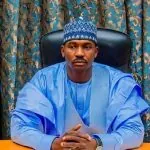By Adagher Tersoo
WHEN Arch. Sunday Echono was appointed Executive Secretary of the Tertiary Education Trust Fund (TETFund) on March 18, 2022, he inherited a vital agency tasked with reviving Nigeria’s public tertiary education. With over three decades of experience in public service, Echono brought to the job not just administrative expertise, but a deep-seated passion for reform and measurable impact. In less than three years, his achievements have drawn commendations across sectors, ranging from infrastructure development and academic research to anti-corruption reforms and international collaboration. His tenure is redefining the scope of what is achievable in education intervention within a short time. From the outset, Echono set out to reposition TETFund beyond a mere disbursement body into a strategic enabler of academic excellence. He initiated a review of the Fund’s operational frameworks to align its interventions with Nigeria’s national development priorities, the United Nations Sustainable Development Goals (SDGs), and international best practices. His leadership philosophy hinged on transparency, efficiency, and a people-first approach. One of his earliest actions was reforming the procurement process. He instituted stringent checks to eliminate sharp practices, shortened project implementation timelines, and increased monitoring. These changes set the tone for an era of accountability and effectiveness at TETFund.
Under Echono’s leadership, TETFund accelerated the completion and commissioning of over 950 infrastructure projects across Nigeria’s public universities, polytechnics, and colleges of education. These included modern lecture halls, laboratories, libraries, hostels, and ICT centres. By expanding academic space, these efforts directly improved teaching and learning environments. Addressing the national student accommodation deficit became another top priority. TETFund invested billions of naira into constructing student hostels across the country. The result: thousands of additional bed spaces, improved hygiene conditions, enhanced security, and better overall welfare for students. Echono also recognized the need to advance Nigeria’s digital capacity. He led the establishment of a National Centre of Excellence for Digital Literacy and supported the deployment of Learning Management Systems (LMS) across institutions. Internet connectivity was upgraded, and infrastructure for hybrid learning was introduced, enabling institutions to adapt to the digital demands of post-pandemic education. One of the most transformative interventions was the establishment of medical simulation centres and cutting-edge laboratories in six university teaching hospitals. These centres now support advanced training and treatment in areas such as cancer care, endourology, and orthopaedic surgery. By equipping Nigerian hospitals with world-class facilities, the initiative is reversing the trend of outbound medical tourism and building local healthcare capacity.
Furthering the commitment to science and technology, TETFund allocated significant resources in the 2023 and 2024 budget cycles to develop multipurpose central laboratories in four regions of Nigeria. These labs are expected to support multiple institutions, boost cross-disciplinary research, and create innovation hubs in fields such as agriculture, engineering, and medicine. To transition Nigeria from a consumer nation to a knowledge-driven economy, Echono revitalized the National Research Fund (NRF). In 2022 alone, 270 research projects received N5.7 billion in funding. In 2023, another N5.1 billion supported 185 projects. Priority was given to applied research that addresses national challenges in agriculture, health, environment, and security. Building on this momentum, the TETFund Alliance for Innovative Research (TETFAIR) and the Research for Impact (R4i) programme trained hundreds of researchers to develop market-ready prototypes. Notable innovations include a self-programmable hearing aid tailored for African users, a smart intraocular pressure reader, and digital health tools for underserved communities. Over 600 lecturers have participated in these prototype development efforts. To address the issue of graduate unemployment, Echono introduced the National Employability Benchmarking Programme in collaboration with the International Finance Corporation (IFC). As a result, tertiary institutions across Nigeria have established Career Service Centres that provide students with job readiness training, entrepreneurial coaching, and access to current industry trends, bridging the gap between academic instruction and labour market needs.
Human capacity development remained central to Echono’s agenda. More than 23,000 PhD candidates and 15,000 Master’s students have received sponsorship through TETFund under his watch. Additionally, over 77,000 academic staff have benefited from training, both locally and internationally, with more than 30,000 undergoing postgraduate programmes. These efforts are raising the overall quality of teaching and research in Nigeria’s tertiary institutions. Echono also strengthened global collaboration by signing academic exchange agreements with universities and research bodies in Brazil, the United Kingdom, Belgium, Sweden, and across the European Union. These partnerships have facilitated joint research in critical areas including food security, education policy, and technological innovation. Locally, TETFund now supports the National Academic Research Repository (NARR) and has rolled out a national anti-plagiarism software system to safeguard academic integrity. Administrative processes for research applications and progress tracking have been digitized, significantly reducing red tape and improving responsiveness.
As part of efforts to enrich local content and knowledge dissemination, TETFund has distributed over 3 million library books, supported the publication of 845 peer-reviewed academic journals, and facilitated the writing and production of over 60 Nigerian-authored textbooks. This investment in intellectual property is helping strengthen Nigeria’s scholarly ecosystem. Agricultural innovation has also benefited from Echono’s strategic vision. (See the rest on www.tribuneonlineng.com)
Through the Agricultural Research and Innovation Fellowship for Africa (ARIFA), 120 Nigerian researchers were trained in Brazil under a partnership with the Forum for Agricultural Research in Africa (FARA).
Outputs from the programme have included drought-resistant crops, climate-resilient farming techniques, and improved post-harvest technologies.
In recognition of his exceptional leadership, Echono has received numerous national and international accolades.
He was conferred with the Officer of the Order of the Niger (OON) and received the Nigerian Patriotism Award. Professional bodies such as the Academic Staff Union of Polytechnics (ASUP), the Colleges of Education Academic Staff Union (COEASU), and the National Association of Academic Technologists (NAAT) have also honoured him.
In 2024 alone, he received the African Leadership Excellence Award in London, the Visionary Leadership in Education Award in Orlando, and a Medal of Honour from FARA in Accra.
Arch. Sonny Echono, in less than three years, has demonstrated that transformational leadership, prudent fund management, and a relentless focus on impact can bring new life to Nigeria’s education sector.
He has shown that educational reform is not just about erecting new buildings, it’s about building futures.
With institutions now better equipped, scholars more empowered, and systems more transparent, Nigeria is making meaningful strides toward a globally competitive tertiary education system.
At the centre of that progress is a leader who views education not merely as policy, but as a national mission.
Echono has carved a legacy in policies and deeds that elevate the collective transformation of our tertiary education landscape. His footprints in public service loom vast; he is a reformer par excellence.
•Tersoo, a critic and public affairs analyst, can be reached via adaghertersoo@gmail.com
READ ALSO: Echono, the ‘Sonny’ side of Nigeria academia
WATCH TOP VIDEOS FROM NIGERIAN TRIBUNE TV
- Relationship Hangout: Public vs Private Proposals – Which Truly Wins in Love?
- “No” Is a Complete Sentence: Why You Should Stop Feeling Guilty
- Relationship Hangout: Friendship Talk 2025 – How to Be a Good Friend & Big Questions on Friendship
- Police Overpower Armed Robbers in Ibadan After Fierce Struggle






